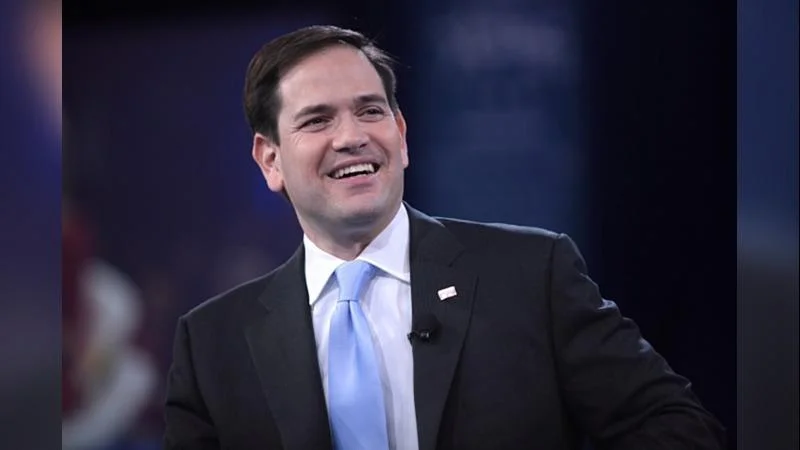Secretary of State Marco Rubio met with Kuwaiti Foreign Minister Abdullah Ali Al-Yahya and Gulf Cooperation Council (GCC) Secretary General Jasem Mohamed Al-Budaiwi, along with foreign ministers from the Gulf region, to discuss ongoing regional issues and strategic partnerships.
Secretary Rubio began by highlighting the importance of the U.S. partnership with each country represented at the meeting. He referenced President Trump's discussions with regional leaders in Riyadh earlier in May, stating: "We’re very committed to this partnership as a whole and with each of the countries that are represented here today, committed to working together to address no shortage of regional and global challenges; but also not just challenges, but also to together work on the opportunities."
Rubio acknowledged recent challenges in the region, especially concerning Gaza and Israel. He said: "We want this conflict to end. We want it to end immediately. The President stated that yesterday. We want it to end with every single hostage being released, both living and deceased. We want it to end in a Gaza that is free of terrorism, that is free of extremism, that does not pose a threat to Israel or any other part of the region..."
He also addressed ongoing efforts related to Syria and Lebanon: "One of them is the future of Syria, an opportunity that maybe two years ago or a year, a year and a half ago, would have been unimaginable... Likewise in Lebanon, an opportunity that’s also historic exists..." Rubio reiterated concerns about Iran's influence in the region: "...the United States strongly views as the destabilizing activities of the regime in Iran... we cannot allow the world’s leading sponsor of terrorism to ever possess weapons of mass destruction like a nuclear weapon."
Kuwaiti Foreign Minister Abdullah Ali Al-Yahya delivered his remarks via interpreter, emphasizing cooperation amid global conflicts: "In this framework, the GCC countries would like to affirm the crucial role of the U.S. in supporting the security and stability of the Gulf region and the Middle East region as a pillar of an effective strategic relationship..." He condemned an Israeli attack on Qatar as "a violation of international law which represents a threat to the stability and security of the region," expressing support for Qatar's security efforts.
Al-Yahya reaffirmed commitment toward resolving Palestinian issues: "We would like to affirm that the Palestinian problem remains in the forefront of our policy... we demand increased efforts to find a two-state solution in line with international law and to lift all obstacles to the delivery of humanitarian aid to Gaza." He praised U.S. efforts regarding Iraq and highlighted hopes for constructive dialogue around Ukraine.
GCC Secretary General Jasem Mohamed Al-Budaiwi also spoke through an interpreter. He expressed appreciation for Secretary Rubio’s hospitality while noting recent events: "...our region has witnessed a highly sensitive event that endangered its security as Israel carried out a flagrant attack against the state of Qatar..." The council condemned this action as “an egregious violation” impacting civilians.
Al-Budaiwi described humanitarian concerns regarding Gaza: "The humanitarian tragedy in the Gaza Strip... will inevitably have grave repercussions threatening regional and international peace and security." He called for an immediate ceasefire, release of hostages, unhindered humanitarian aid delivery, and progress toward establishing an independent Palestinian state based on 1967 borders per international resolutions.
He stressed respect for Syria’s sovereignty while condemning Israeli actions there; he affirmed support for Lebanon’s stability; he noted maritime security concerns; he described economic ties including trade exceeding $120 billion between GCC states and U.S., supported by significant investments across sectors such as technology and energy.
On cultural ties he said: "This relationship has also extended to education and cultural exchange with tens of thousands of Gulf students currently studying in U.S. universities..." The GCC seeks continued ease for students attending American institutions due to their impact on bilateral relations.
Al-Budaiwi added: "On diplomatic level, GCC looks forward to opening diplomatic mission in Washington D.C...." He requested Secretary Rubio encourage completion procedures so privileges can be provided for this mission.
Concluding his statement he remarked: "...our partnership with United States is strategic necessity that ensures security, stability, prosperity for all..."
The meeting underscored ongoing cooperation between GCC member states and United States across political dialogue forums since 2012—these forums have led to joint projects addressing defense capacity building as well as economic integration.





